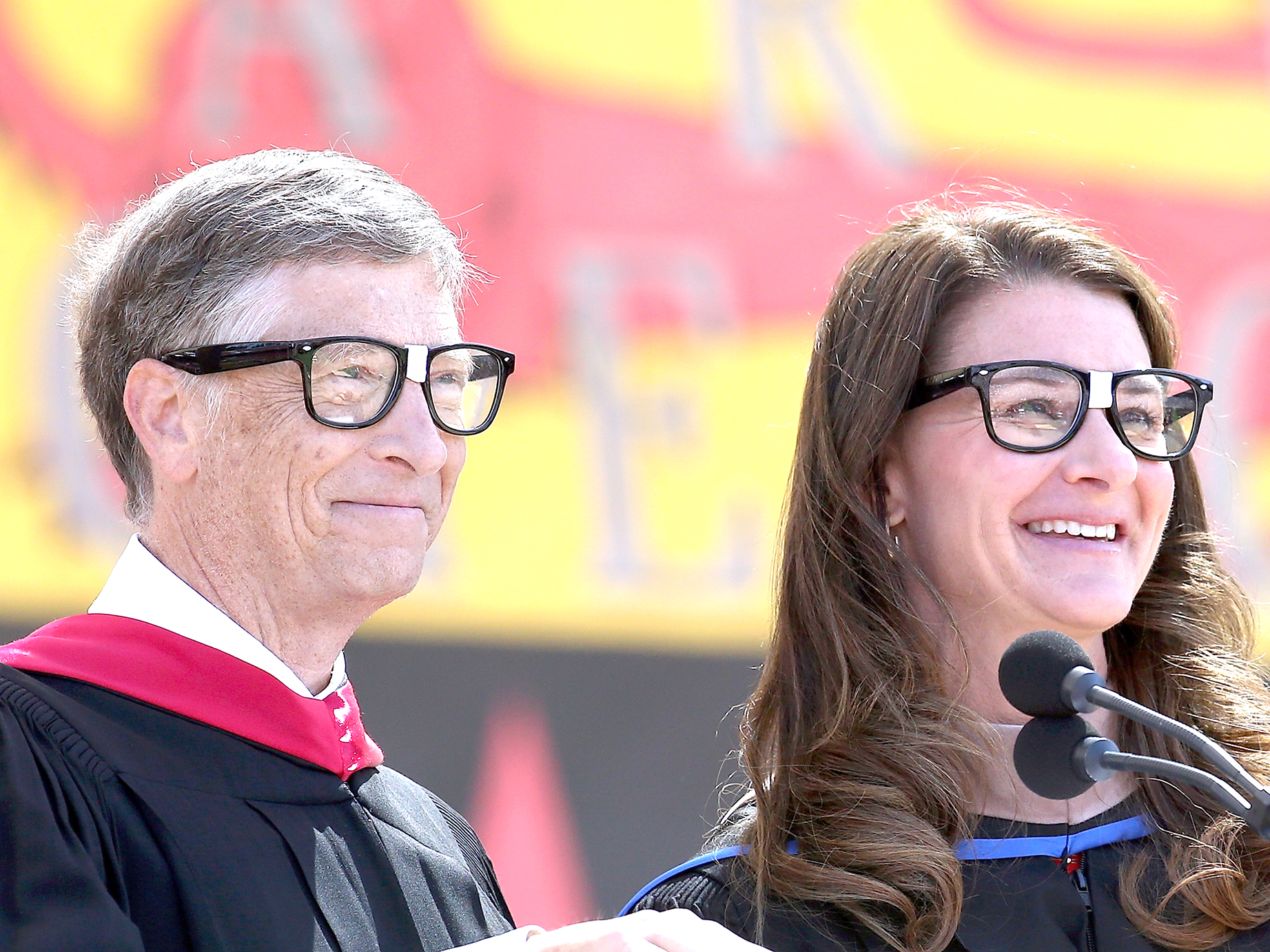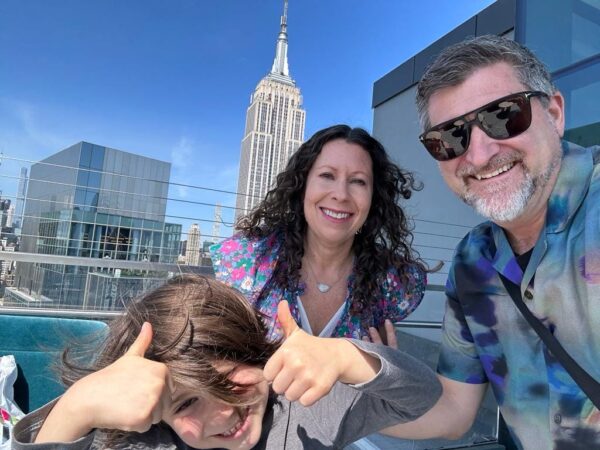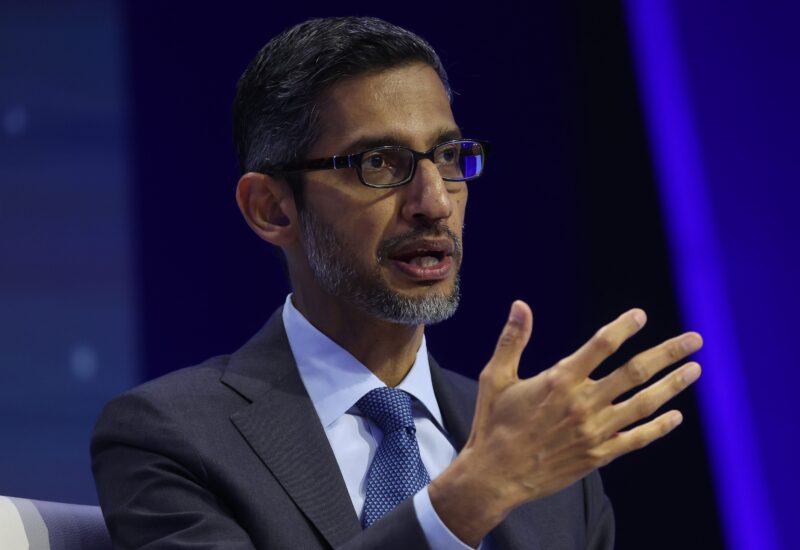- Most commencement speeches follow a similar formula, but some are so inspiring that we remember them long after we graduate.
- Personalities as varied as John F. Kennedy, Conan O’Brien, Steve Jobs, and Oprah have been offering life advice and words of encouragement to graduates for decades.
- Many commencement ceremonies nationwide have been canceled or postponed due to the coronavirus pandemic, but these inspiring words still ring true.
- Visit Business Insider’s homepage for more stories.
Many commencement speeches are forgettable, filled with the same clichéd advice.
However, some are so good – so inspiring and poignant – that they stick with us forever.
In these trying times when we could all use a little inspiration, we put together a list of the best pieces of advice from the greatest speeches of all time.
Here are 21 of the most valuable pieces of advice from commencement speeches you wish you’d heard on your graduation day.
Rachel Sugar and Ivan De Luce contributed to an earlier version of this article.
"Ditch the dream and be a doer, not a dreamer." — Shonda Rhimes' 2014 speech at Dartmouth College

The world's most powerful showrunner told grads to stop dreaming and start doing.
The world has plenty of dreamers, she said. "And while they are busy dreaming, the really happy people, the really successful people, the really interesting, engaged, powerful people, are busy doing." She pushed grads to be those people.
"Ditch the dream and be a doer, not a dreamer," she advised - whether or not you know what your "passion" might be. "The truth is, it doesn't matter. You don't have to know. You just have to keep moving forward. You just have to keep doing something, seizing the next opportunity, staying open to trying something new. It doesn't have to fit your vision of the perfect job or the perfect life. Perfect is boring and dreams are not real," she said.
Read the transcript and watch the video.
"If you really learn how to pay attention, then you will know there are other options." — David Foster Wallace's 2005 speech at Kenyon College

In his now-legendary "This Is Water" speech, the author urged grads to be a little less arrogant and a little less certain about their beliefs.
"This is not a matter of virtue," Wallace said. "It's a matter of my choosing to do the work of somehow altering or getting free of my natural, hard-wired default setting, which is to be deeply and literally self-centered and to see and interpret everything through this lens of self."
Doing that will be hard, he said. "It takes will and effort, and if you are like me, some days you won't be able to do it, or you just flat won't want to."
But breaking free of that lens can allow you to truly experience life, to consider possibilities beyond your default reactions.
"If you're automatically sure that you know what reality is, and you are operating on your default setting, then you, like me, probably won't consider possibilities that aren't annoying and miserable," he said. "But if you really learn how to pay attention, then you will know there are other options. It will actually be within your power to experience a crowded, hot, slow, consumer-hell type situation as not only meaningful, but sacred, on fire with the same force that made the stars: love, fellowship, the mystical oneness of all things deep down."
Read the transcript and watch the video.
"Not everything that happens to us happens because of us." — Sheryl Sandberg's 2016 speech at UC Berkeley

During the Facebook COO's deeply personal commencement speech about resilience at UC Berkeley, she spoke on how understanding the three Ps that largely determine our ability to deal with setbacks helped her cope with the loss of her husband, Dave Goldberg.
She outlined the three Ps as:
· Personalization: Whether you believe an event is your fault. · Pervasiveness: Whether you believe an event will affect all areas of your life. · Permanence: How long you think the negative feelings will last.
"This is the lesson that not everything that happens to us happens because of us," Sandberg said about personalization. It took understanding this for Sandberg to accept that she couldn't have prevented her husband's death. "His doctors had not identified his coronary artery disease. I was an economics major; how could I have?"
Read the transcript and watch the video.
"Err in the direction of kindness." — George Saunders' 2013 speech at Syracuse University
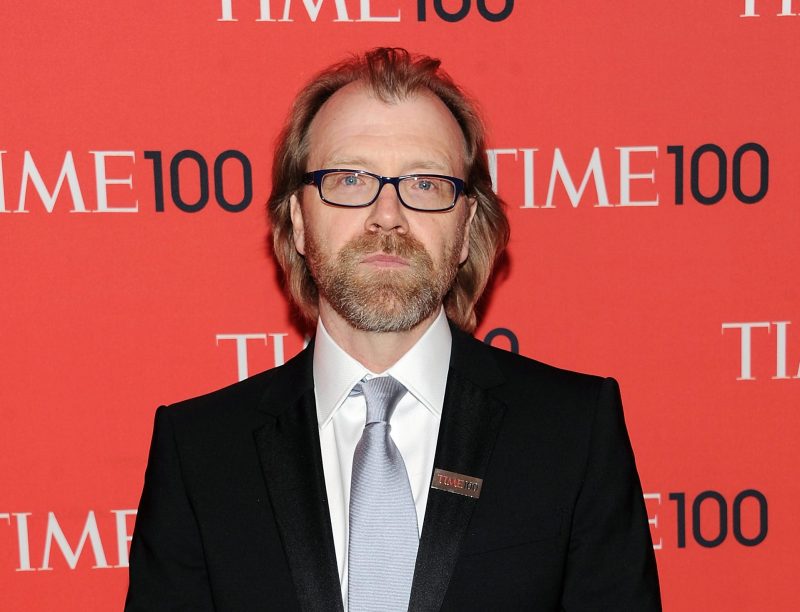
Saunders stressed what turns out to be a deceptively simple idea: the importance of kindness. "What I regret most in my life are failures of kindness," he said. "Those moments when another human being was there, in front of me, suffering, and I responded ... sensibly. Reservedly. Mildly."
But kindness is hard, the writer said. It's not necessarily our default. In part, he explained, kindness comes with age. "It might be a simple matter of attrition: as we get older, we come to see how useless it is to be selfish - how illogical, really." The challenge he laid out: Don't wait. "Speed it along," he urged. "Start right now."
"There's a confusion in each of us, a sickness, really: selfishness," Saunders said. "But there's also a cure. So be a good and proactive and even somewhat desperate patient on your own behalf - seek out the most efficacious anti-selfishness medicines, energetically, for the rest of your life."
"Do all the other things, the ambitious things - travel, get rich, get famous, innovate, lead, fall in love, make and lose fortunes, swim naked in wild jungle rivers (after first having it tested for monkey poop) - but as you do, to the extent that you can, err in the direction of kindness."
Read the transcript and watch the video.
"Life is an improvisation. You have no idea what's going to happen next and you are mostly just making things up as you go along." — Stephen Colbert's 2011 speech at Northwestern University
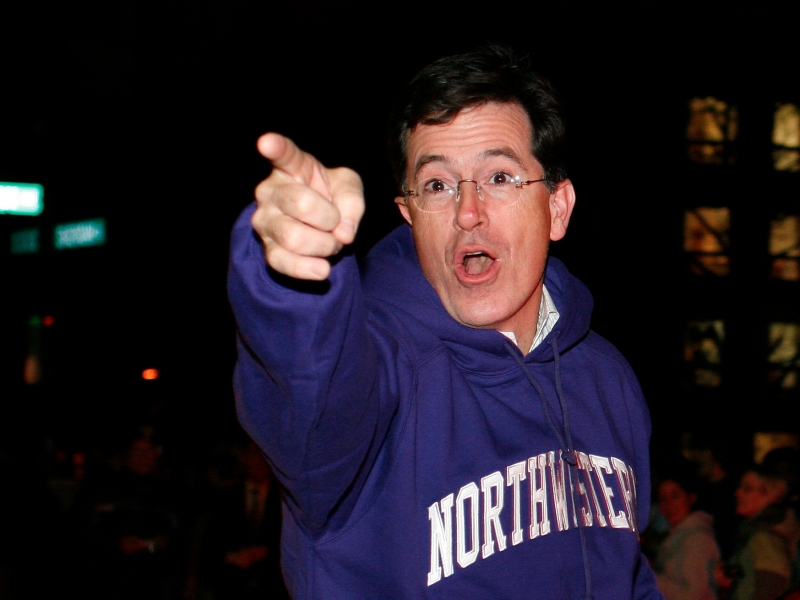
The comedian and host of the "Late Show" told grads they should never feel like they have it all figured out.
"[W]hatever your dream is right now, if you don't achieve it, you haven't failed, and you're not some loser. But just as importantly - and this is the part I may not get right and you may not listen to - if you do get your dream, you are not a winner," Colbert said.
It's a lesson he learned from his improv days. When actors are working together properly, he explained, they're all serving each other, playing off each other on a common idea. "And life is an improvisation. You have no idea what's going to happen next and you are mostly just making things up as you go along. And like improv, you cannot win your life," he said.
Red the transcript and watch the video.
"Be the heroine of your life, not the victim." — Nora Ephron's 1996 speech at Wellesley College
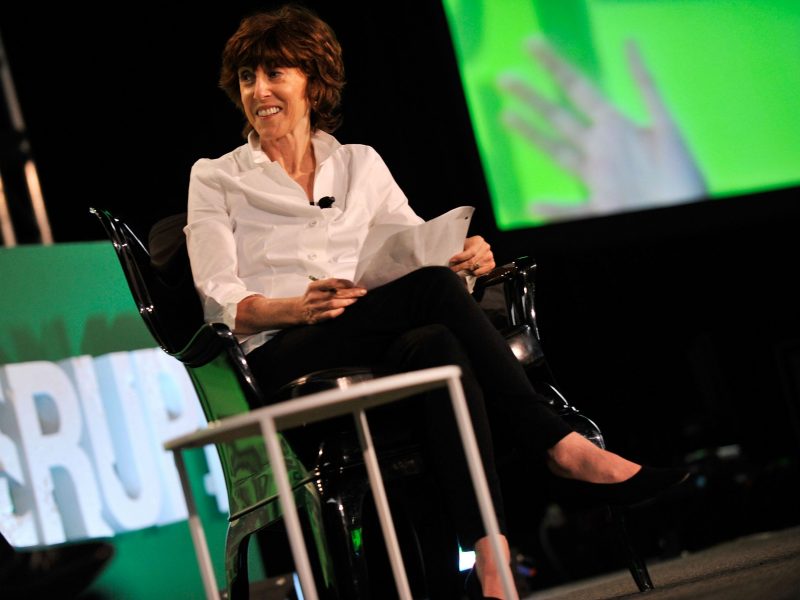
Addressing her fellow alums with trademark wit, Ephron reflected on all the things that had changed since her days at Wellesley - and all the things that hadn't.
"My class went to college in the era when you got a master's degrees in teaching because it was 'something to fall back on' in the worst case scenario, the worst case scenario being that no one married you and you actually had to go to work," she said. But while things had changed drastically by 1996, Ephron warned grads not to "delude yourself that the powerful cultural values that wrecked the lives of so many of my classmates have vanished from the earth."
"Above all, be the heroine of your life, not the victim," she said. "Maybe young women don't wonder whether they can have it all any longer, but in case any of you are wondering, of course you can have it all. What are you going to do? Everything, is my guess. It will be a little messy, but embrace the mess. It will be complicated, but rejoice in the complications."
Read the transcript and watch the video.
"Remembering that you are going to die is the best way I know to avoid the trap of thinking you have something to lose." — Steve Jobs' 2005 speech at Stanford University

In a remarkably personal address, the Apple founder and CEO advised graduates to live each day as if it were their last.
"Remembering that I'll be dead soon is the most important tool I've ever encountered to help me make the big choices in life," he said. He'd been diagnosed with pancreatic cancer a year earlier.
"Because almost everything - all external expectations, all pride, all fear of embarrassment or failure - these things just fall away in the face of death, leaving only what is truly important," he continued. "Remembering that you are going to die is the best way I know to avoid the trap of thinking you have something to lose. You are already naked. There is no reason not to follow your heart."
Jobs said this mindset will make you understand the importance of your work. "And the only way to do great work is to love what you do," he said. "If you haven't found it yet, keep looking. Don't settle. As with all matters of the heart, you'll know when you find it."
Settling means giving in to someone else's vision of your life - a temptation Jobs warned against. "Don't let the noise of others' opinions drown out your own inner voice. And most important, have the courage to follow your heart and intuition."
Read the transcript and watch the video.
"We can learn to live without the sick excitement, without the kick of having scores to settle." — Kurt Vonnegut's 1999 speech at Agnes Scott College

The famed author became one of the most sought-after commencement speakers in the United States for many years, thanks to his insights on morality and cooperation. At Agnes Scott, he asked graduates to make the world a better place by respecting humanity - and living without hate. Hammurabi lived 4,000 years ago, he pointed out. We can stop living by his code.
"We may never dissuade leaders of our nation or any other nation from responding vengefully, violently, to every insult or injury. In this, the Age of Television, they will continue to find irresistible the temptation to become entertainers, to compete with movies by blowing up bridges and police stations and factories and so on," he said.
"But in our personal lives, our inner lives, at least, we can learn to live without the sick excitement, without the kick of having scores to settle with this particular person, or that bunch of people, or that particular institution or race or nation. And we can then reasonably ask forgiveness for our trespasses, since we forgive those who trespass against us."
The result, he said, would be a happier, more peaceful, and more complete existence.
Read the partial transcript and watch the video.
"If it doesn't feel right, don't do it." — Oprah Winfrey's 2008 speech at Stanford University

The media mogul told Stanford's class of 2008 that they can't sacrifice happiness for money. "When you're doing the work you're meant to do, it feels right and every day is a bonus, regardless of what you're getting paid," she said.
She said you can feel when you're doing the right thing in your gut. "What I know now is that feelings are really your GPS system for life. When you're supposed to do something or not supposed to do something, your emotional guidance system lets you know," she said.
She explained that doing what your instincts tells you to do will make you more successful because it will drive you to work harder and will save you from debilitating stress.
"If it doesn't feel right, don't do it. That's the lesson. And that lesson alone will save you, my friends, a lot of grief," Winfrey said. "Even doubt means don't. This is what I've learned. There are many times when you don't know what to do. When you don't know what to do, get still, get very still, until you do know what to do."
Read the transcript and watch the video.
"The difference between triumph and defeat, you'll find, isn't about willingness to take risks — it's about mastery of rescue." — Atul Gawande's 2012 speech at Williams College

Pushing beyond the tired "take risks!" commencement cliché, the surgeon, writer, and activist took a more nuanced approach: what matters isn't just that you take risks; it's how you take them.
To explain, he turned to medicine."Scientists have given a new name to the deaths that occur in surgery after something goes wrong - whether it is an infection or some bizarre twist of the stomach," said Gawande. "They call them a 'Failure to Rescue.' More than anything, this is what distinguished the great from the mediocre. They didn't fail less. They rescued more."
What matters, he said, isn't the failure - that's inevitable - but what happens next. "A failure often does not have to be a failure at all. However, you have to be ready for it. Will you admit when things go wrong? Will you take steps to set them right? - because the difference between triumph and defeat, you'll find, isn't about willingness to take risks. It's about mastery of rescue."
Read the transcript and watch the video.
"Your job is to create a world that lasts forever." — Stephen Spielberg's 2016 speech at Harvard

"This world is full of monsters," director Steven Spielberg told Harvard graduates, and it's the next generation's job to vanquish them.
"My job is to create a world that lasts two hours. Your job is to create a world that lasts forever," he said.
These monsters manifest themselves as racism, homophobia, and ethnic, class, political, and religious hatred, he said, noting that there is no difference between them: "It is all one big hate."
Spielberg said that hate is born of an "us versus them" mentality, and thinking instead about people as "we" requires replacing fear with curiosity.
"'Us' and 'them' will find the 'we' by connecting with each other, and by believing that we're members of the same tribe, and by feeling empathy for every soul," he said.
Read the transcript and watch the video.
"It is impossible to live without failing at something, unless you live so cautiously that you might as well not have lived at all — in which case, you fail by default." — J.K. Rowling's 2008 speech at Harvard University

The author of the "Harry Potter"series told Harvard's class of 2008 about the dark period she experienced before achieving success. "An exceptionally short-lived marriage had imploded, and I was jobless, a lone parent, and as poor as it is possible to be in modern Britain, without being homeless. The fears that my parents had had for me, and that I had had for myself, had both come to pass, and by every usual standard, I was the biggest failure I knew," Rowling said.
But when she was at the bottom, she realized that her life went on, and she decided to press forward. "You might never fail on the scale I did, but some failure in life is inevitable," she said. "It is impossible to live without failing at something, unless you live so cautiously that you might as well not have lived at all - in which case, you fail by default.
"You will never truly know yourself, or the strength of your relationships, until both have been tested by adversity. Such knowledge is a true gift, for all that it is painfully won, and it has been worth more than any qualification I ever earned," she said.
Read the transcript and watch the video.
"Identity is something that you are constantly earning." — Joss Whedon's 2013 speech at Wesleyan University

Speaking at his alma mater, the writer, director, and producer encouraged graduates to embrace inner conflict. For one thing, it's inevitable - and it never goes away.
But it's also useful, he argued. "I believe these contradictions and these tensions are the greatest gift that we have, and hopefully, I can explain that," he said. Whatever path you take, you'll always have doubts. "For your entire life, you will be doing, on some level, the opposite - not only of what you were doing - but of what you think you are."
Listen to those tensions, he urged. "To accept duality is to earn identity. And identity is something that you are constantly earning. It is not just who you are. It is a process that you must be active in."
Read the transcript and watch the video.
"Our problems are manmade — therefore, they can be solved by man." — John F. Kennedy's 1963 speech at American University
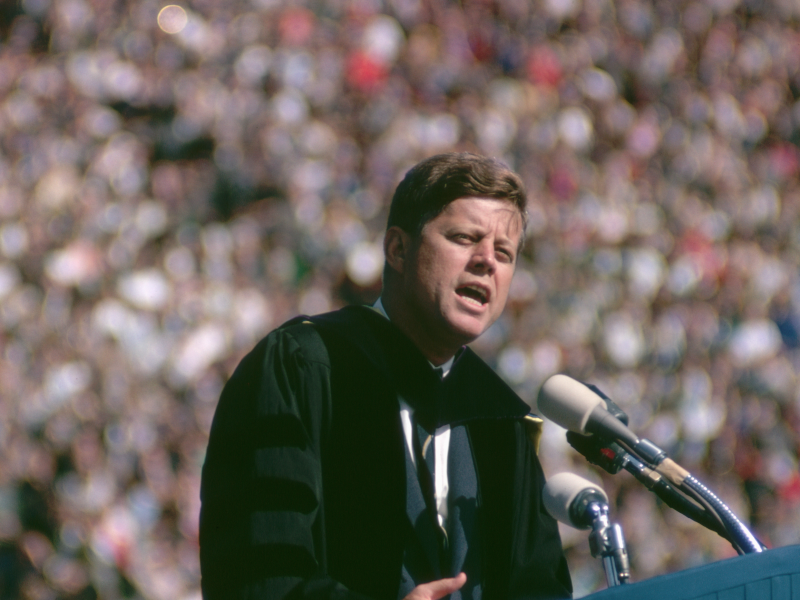
Against the tumult of the early '60s, Kennedy inspired graduates to strive for what may be the biggest goal of them all: world peace.
"Too many of us think it is impossible," he said. "Too many think it unreal. But that is a dangerous, defeatist belief. It leads to the conclusion that war is inevitable - that mankind is doomed - that we are gripped by forces we cannot control."
Our job is not to accept that, he urged. "Our problems are manmade - therefore, they can be solved by man. And man can be as big as he wants."
Read the transcript and watch the video.
"You are your own stories." — Toni Morrison's 2004 speech at Wellesley College
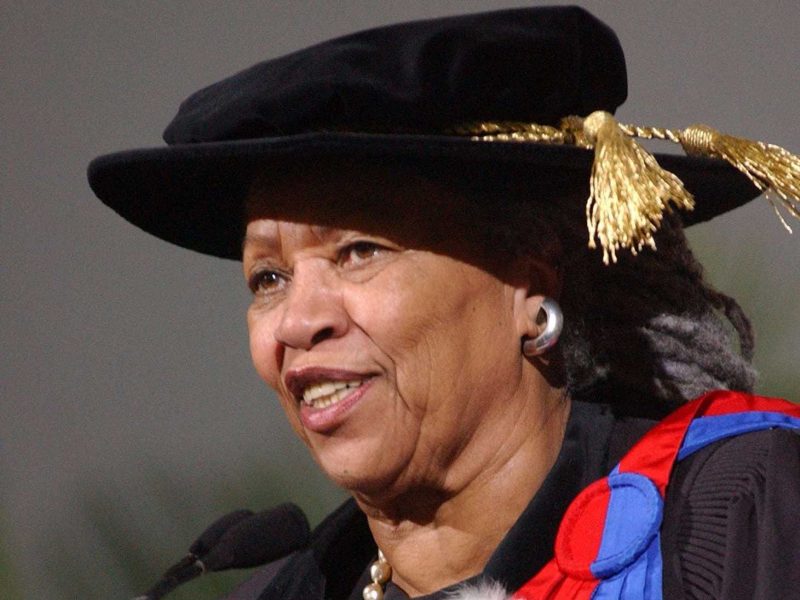
Instead of the usual commencement platitudes - none of which, Morrison argued, are true anyway - the Nobel Prize-winning writer asked grads to create their own narratives.
"What is now known is not all what you are capable of knowing," she said. "You are your own stories and therefore free to imagine and experience what it means to be human without wealth. What it feels like to be human without domination over others, without reckless arrogance, without fear of others unlike you, without rotating, rehearsing and reinventing the hatreds you learned in the sandbox."
In your own story, you can't control all the characters, Morrison said. "The theme you choose may change or simply elude you. But being your own story means you can always choose the tone. It also means that you can invent the language to say who you are and what you mean." Being a storyteller reflects a deep optimism, she said - and as a storyteller herself, "I see your life as already artful, waiting, just waiting and ready for you to make it art."
Read the transcript and watch the video.
"There are few things more liberating in this life than having your worst fear realized." — Conan O'Brien's 2011 speech at Dartmouth College

In his hilarious 2011 address to Dartmouth College, the late-night host spoke about his brief run on "The Tonight Show" before being replaced by Jay Leno. O'Brien described the fallout as the lowest point in his life, feeling very publicly humiliated and defeated. But once he got back on his feet and went on a comedy tour across the country, he discovered something important.
"There are few things more liberating in this life than having your worst fear realized," he said.
He explained that for decades the ultimate goal of every comedian was to host "The Tonight Show," and like many comedians, he thought achieving that goal would define his success. "But that is not true. No specific job or career goal defines me, and it should not define you," he said.
He noted that disappointment is a part of life, and the beauty of it is that it can help you gain clarity and conviction.
"It is our failure to become our perceived ideal that ultimately defines us and makes us unique," O'Brien said. "It's not easy, but if you accept your misfortune and handle it right, your perceived failure can be a catalyst for profound re-invention."
O'Brien said that dreams constantly evolve, and your ideal career path at 22 years old will not necessarily be the same at 32 or 42 years old.
"I am here to tell you that whatever you think your dream is now, it will probably change. And that's okay," he said.
Read the transcript and watch the video.
"I wake up in a house that was built by slaves." — Michelle Obama's 2016 speech at the City College of New York

In her 23rd and final commencement speech as First Lady, Michelle Obama urged the Class of 2016 to pursue happiness and live out whatever version of the American Dream is right for them.
"It's the story that I witness every single day when I wake up in a house that was built by slaves," she said, "and I watch my daughters - two beautiful, black young women - head off to school waving goodbye to their father, the President of the United States, the son of a man from Kenya who came here to America for the same reasons as many of you: To get an education and improve his prospects in life."
"So, graduates, while I think it's fair to say that our Founding Fathers never could have imagined this day," she continued, "all of you are very much the fruits of their vision. Their legacy is very much your legacy and your inheritance. And don't let anybody tell you differently. You are the living, breathing proof that the American Dream endures in our time. It's you."
Read the transcript and watch the video.
"Empathy and kindness are the true signs of emotional intelligence." — Will Ferrell's 2017 speech at the University of Southern California

Comedian Will Ferrell, best known for lead roles in films like "Anchorman," "Elf," and "Talledega Nights," delivered a thoughtful speech to USC's graduating class of 2018.
"No matter how cliché it may sound, you will never truly be successful until you learn to give beyond yourself," he said. "Empathy and kindness are the true signs of emotional intelligence, and that's what Viv and I try to teach our boys. Hey Matthias, get your hands of Axel right now! Stop it. I can see you. Okay? Dr. Ferrell's watching you."
He also offered some words of encouragement: "For many of you who maybe don't have it all figured out, it's okay. That's the same chair that I sat in. Enjoy the process of your search without succumbing to the pressure of the result."
He even finished off with a stirring rendition of the Whitney Houston classic, "I Will Always Love You." He was, of course, referring to the graduates.
Read the transcript and watch the video.
"Call upon your grit. Try something." — Tim Cook's 2019 speech at Tulane University

Apple CEO Tim Cook delivered the 2019 commencement speech for the graduates of Tulane University, offering valuable advice on success.
"We forget sometimes that our preexisting beliefs have their own force of gravity," Cook said. "Today, certain algorithms pull toward you the things you already know, believe, or like, and they push away everything else. Push back."
"You may succeed. You may fail. But make it your life's work to remake the world because there is nothing more beautiful or more worthwhile than working to leave something better for humanity."
Read the transcript and watch the video.
"We’re going to put a little fuel in your bus." — Robert F. Smith's 2019 speech at Morehouse College

Billionaire investor and CEO of Vista Equity Partners Robert F. Smith shocked the class of 2019 at Morehouse College when he announced he'd cover their student debt.
"We are enough to ensure we have all the opportunities of the American Dream," he said. "And we will show it to each other through our actions and through our words and through our deeds."
"Don't forget that communities thrive in the smallest of gestures. Be the first to congratulate a friend on their new job," he continued. "Be the first to console them when they face adversity."
Read the transcript and watch the video.
"Whatever your professional goals, wherever you live, whoever you are, there are ways, big and small, that you can participate in making the world better for everyone." — Bill and Melinda Gates, Wall Street Journal essay "The Better World That You Will Build."
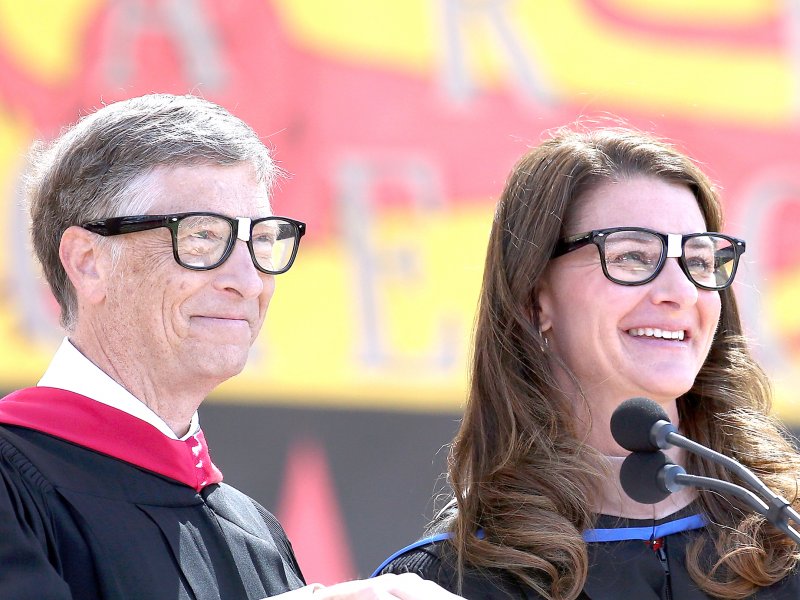
Although college graduation ceremonies nationwide have been postponed or canceled due to the coronavirus pandemic, Bill and Melinda Gates shared some advice for the graduating class in a Wall Street Journal essay titled, "The Better World That You Will Build."
In a time of great uncertainty both economically and socially, the essay inspired college graduates to look forward and pursue meaningful careers and have hope that they will create positive change in the world.
"There is no question that you have a role to play, whether that's now or in the future. You inherit a world that has already proven that progress is possible - a world that has rebuilt after war, vanquished smallpox, fed a growing population, and enabled more than a billion people to climb out of extreme poverty," the essay reads.
"That progress didn't happen by accident or fate. It was the result of people just like you who made a commitment that whatever else they did with their lives and careers, they would contribute to this shared mission of propelling us all forward. Class of 2020, these are not easy times. But we will get through them. And with your leadership, the world will be stronger than before."
Read the essay.
- Read more:
- 'The world will be stronger than before:' Bill and Melinda Gates gave a commencement speech to students graduating into a COVID-19 world
- I'm a senior at Harvard University who thought I had 2 months until graduation. When we heard we had five days left, my friends and I staged our own ceremony.
- Barack and Michelle Obama will host 3 virtual graduation events for the class of 2020
